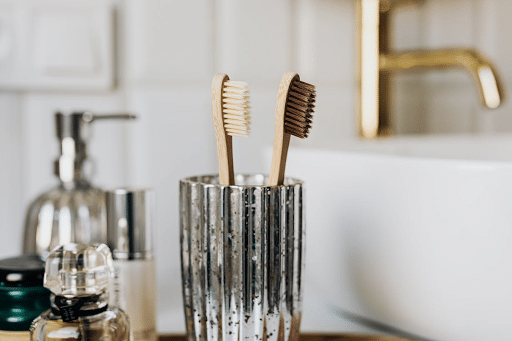
Perhaps you are familiar with dry brushing your body for its many health and skin benefits, but have you heard of dry brushing your teeth?
This type of dry brushing is when you brush your teeth without water or toothpaste. You may be hesitant to try the dry brushing method because your dentist has always encouraged you to brush twice a day with fluoride toothpaste. While it may seem like a crazy way to brush your teeth, it’s showing some definite benefits!
Why Would Anyone Dry Brush Their Teeth?
Just like dry brushing your body has several benefits, so does dry brushing your teeth.
- Save On Toothpaste: You will save yourself money by using less toothpaste.
- Helps You Brush Longer: Did you know that using toothpaste can sometimes give you a false impression? Sure, toothpaste freshens up your breath, but this minty fresh flavor often leads to many people ending tooth brushing before their teeth are even clean.
- Use Your Toothbrush Anywear: No need to carry along a tube of toothpaste in your purse, if you have your toothbrush you can now dry brush anywhere.
- Toothpaste commonly contains glycerin: This can help your teeth feel extra smooth after brushing with toothpaste. However, when dry brushing, your teeth will only feel smooth if you remove all the plaque with your toothbrush. You might find yourself brushing longer and more thoroughly when you dry brush your teeth.
When Should I Dry Brush My Teeth?
Whether you are dry brushing or brushing with toothpaste, it is recommended that you brush your teeth twice a day. There are different ideas about when to dry brush and how often, but we still suggest that you use toothpaste periodically as it has its benefits, such as fluoride uptake for your teeth.
Brushing with toothpaste once a day as well dry brushing once a day can be a great way to start when you are first experimenting with dry brushing. It will allow your teeth to still get the fluoride they need and enable you to compare the difference of your teeth between dry brushing versus using toothpaste.
Dental Dos And Don’ts
Whether you are dry brushing or wet brushing, it is essential to remember what you should be doing and not be doing when it comes to your oral health:
- Do: Brush twice a day.
- Do: Brush for at least 2 minutes.
- Do: Rinse your toothbrush well with water after brushing to remove bacteria.
- Don’t: Brush too with too much pressure or with a hard-bristled toothbrush as this can wear on the enamel of your teeth and your gum tissue.
- Don’t: Use your toothbrush for more than six months.
Many who have tried dry brushing have commented on how they feel like they are doing a better job when brushing their teeth. Perhaps they are more focused on the time they are brushing, or maybe it’s because they are more aware of how their teeth feel when they are dirty. We have had more patients asking about dry brushing, and if you too find yourself curious, we think you should give dry brushing a try! If you’re concerned as to whether or not you’re a good candidate for dry brushing, ask us next time you are in your office! You never know, you might find that you love this new way of brushing your teeth!!